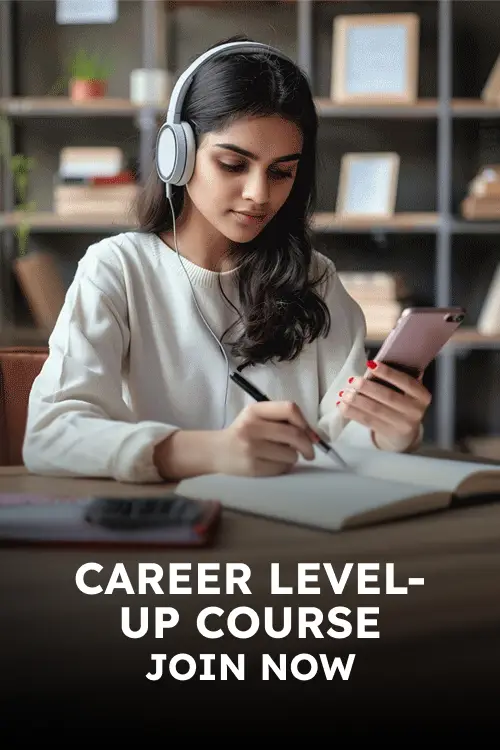Table of Contents
Key Takeaways:
- Preparation is key: research the company, practice questions, and optimize your environment for remote interviews.
- Technical readiness—testing your microphone, camera, and connection—saves you from last-minute mishaps.
- Your communication style and body language can create a strong, positive impression, even through a screen or a call.
- Each format (phone, live video, pre-recorded) calls for tailored approaches and professional presence.
- Self-improvement with programs like the Entri Personality Development Course builds interview confidence and personal branding for long-term career growth.
Introduction
Getting a callback for an interview is exciting—but in today’s job market, that often means prepping for an interview you won’t even attend in person. Maybe it’s a phone screen with a recruiter who seems to speak a mile a minute, or a video call where your own reflection is staring back at you. These formats can be daunting: no reassuring handshake, sometimes no face at all, and always the pressure to make every word count.
If you’ve ever finished a remote interview and wondered if you came across as genuinely as you do in real life, you’re not alone. The good news is that success comes down to skills you can actively build: thoughtful preparation, digital communication savvy, and a little bit of practice. With these strategies, you can turn any remote interview—from your couch or kitchen table—into a strong first impression that gets you to the next round.
What Makes Phone and Video Interviews Different?
- Often, assessments begin before you even speak—through your punctuality, username, or the first sound of your voice.
- Unexpected challenges like audio glitches, awkward silences, or background interruptions are common in remote formats.
- Employers look for clarity and adaptability, testing how well candidates communicate and handle the tools of virtual collaboration.
Boost Your Skills & Kickstart Your Career!
Employability and Personality Development Course by Entri App: Enhance your communication, confidence, and job-ready skills to excel in your career.
Join Now!Getting Ready: The Fundamentals
- Research the company thoroughly: check the website, social media, reviews, and any press releases related to their work culture or recent achievements.
- Review the job description and note key skills—tailor your answers to show how your experience matches the role.
- Practice common interview questions and rehearse your responses out loud, aiming for concise, engaging stories.
- Prepare insightful questions for the interviewer. Ask about team dynamics, company growth, or how success is measured.
- Use structured response methods like STAR (Situation, Task, Action, Result) or SOAR (Situation, Obstacle, Action, Result) to keep answers organized and memorable.
Technical Preparation: Setting Up for Success
- Test all your tech—microphone, camera, internet, and software—before your interview. Technical issues are the top culprit for a rocky start.
- Get familiar with the interview platform well in advance (Zoom, Teams, Skype, etc.). Know how to join, mute/unmute, and share your screen.
- Choose a quiet, clutter-free, and well-lit space. Natural light works best, but a lamp behind your camera can help you look focused and approachable.
- Use a laptop or desktop for stability; prop up your device so the camera is at eye level. This helps you maintain direct “eye contact.”
- Use headphones for clearer sound and fewer echoes; close extra browser tabs and silence notifications on all devices.
How to Present Yourself on Camera or Phone
- Dress for success—even for phone interviews. Clothes affect your mindset and speech. Solid colors work best on camera to avoid distraction.
You might like: How to Dress for a Job Interview
- Sit up straight and position yourself so your head and shoulders are visible, with minimal background clutter.
- Make eye contact with the camera, not the screen, to create a sense of connection with your interviewer.
- Smile naturally and remember to use expressive body language—even on the phone, it can energize your voice.
- Keep a copy of your resume, key accomplishments, and your notes handy for quick reference. Prompts can be especially useful for phone interviews—just make sure you’re glancing and not reading word-for-word.
People also read: 10 Best Skills to Include on a Resume
Boost Your Skills & Kickstart Your Career!
Employability and Personality Development Course by Entri App: Enhance your communication, confidence, and job-ready skills to excel in your career.
Join Now!Navigating Common Interview Formats
Live Video Interviews
- Treat these like in-person meetings: be punctual, maintain good posture, and greet interviewers warmly.
- Keep your surroundings neat. Use virtual backgrounds judiciously; neutral environments work best if your real background is distracting.
- If you hit a technical snag, remain calm. Politely let the interviewer know and try to resolve it quickly or suggest reconnecting.
Pre-Recorded Video Interviews
- Expect a series of questions displayed onscreen or played as videos. You’ll have a limited window to record each answer.
- Read every prompt carefully and take a breath to organize your thoughts before recording. Practice answering into a camera alone to get comfortable.
- Imagine discussing with a real person to bring energy and approachability to your responses. Keep answers focused and within the time limit.
Phone Interviews
- Find a quiet space and use a landline or strong mobile signal when possible. Stand or sit up straight to project confidence.
- Speak clearly and at a moderate pace, with intentional pauses. Smiling as you speak will subtly shift your tone to sound warmer and more engaging.
- Listen actively, using verbal cues (“I see,” “That’s interesting”) to show engagement. Don’t be afraid of a little silence—it gives space for thoughtful answers.
- Take notes unobtrusively on key points raised by the interviewer, which can help you reference them later or prepare your follow-up.
Practice Makes Perfect
- Do mock interviews with friends, in front of a mirror, or with a career coach. Practice on camera and phone for maximum comfort.
- Record yourself to spot nervous habits like fidgeting or speaking too quickly, and review for clarity and energy.
- Immediately after each interview, write down what went well and what you’d like to improve. This reflection helps turn each experience into growth.
If you’re looking to further hone your skills, Entri’s Personality Development Course provides hands-on practice, feedback, and expert strategies specifically designed for virtual interview success—even if you’re new to online interviews.
Tips for After the Interview
- Thank your interviewer promptly, either in writing (email is usually best) or via a brief follow-up call if appropriate.
- Reflect on the experience: jot down what you did well and what you want to improve next time. Building this habit is key to continuous growth.
- Continue engaging with company news or content if you’re genuinely interested in the company. This can help in future rounds or if another opportunity arises.
Also read: Follow-up Email After an Interview (Examples and Templates)
Quick Reference Tips:
- Prepare thoroughly—know the company, your resume, and the role’s requirements.
- Ensure your technology and environment are interview-ready well ahead of the start time.
- Communicate clearly, with energy and confidence.
- Smile, use body language, and pause so that your words land.
- Keep prompts nearby, but use them only as guides.
- Reflect and improve after every interview.
- Success comes from repeated effort and feedback.
Ready to excel at every interview?
Building true confidence and communication skills is a journey. Practical mock interviews, expert advice, and continuous feedback—like those found in Entri’s Personality Development Course—can equip you to succeed at every stage, whether on phone, video, or in-person. Invest in your potential and let your next interview be a showcase of your best self.
Conclusion
Mastering phone and video interviews is a crucial skill in today’s evolving job market. While remote interviews come with unique challenges, they also offer a great opportunity to showcase your adaptability, communication skills, and professionalism from any location. With deliberate preparation—researching the company, rehearsing your responses, and ensuring your technology and environment are set up for success—you can confidently turn these virtual meetings into real career breakthroughs.
Remember, every interview is a chance to learn and improve. By practicing regularly and reflecting on your experiences, you’ll build not only skills but also lasting confidence. For an extra advantage, consider joining Entri’s Personality Development Course, which offers expert guidance to enhance your communication, presentation, and interview strategies. Your career journey deserves the best possible start, and with these tips, you’ll be ready to impress any interviewer, anywhere.
Boost Your Skills & Kickstart Your Career!
Employability and Personality Development Course by Entri App: Enhance your communication, confidence, and job-ready skills to excel in your career.
Join Now!Frequently Asked Questions
What should I wear for a phone interview?
Wear smart clothes that help you feel focused—research shows mindset improves your responses, even if you aren’t seen.
How do I handle unexpected interruptions during a remote interview?
Briefly apologize, mute your mic if needed, resolve the issue, then rejoin the conversation with renewed focus.
Is it okay to use notes during interviews?
Absolutely—but keep points concise and avoid reading full answers. A few reference prompts are helpful, especially on phone interviews.
How can I shake off nerves before an interview?
Try deep breathing, positive visualization, and warming up with practice questions in the same setup you’ll use for the real thing.
What’s the best way to finish an interview?
Thank the interviewer, clearly express enthusiasm for the opportunity, and ask about the next steps in their process.















